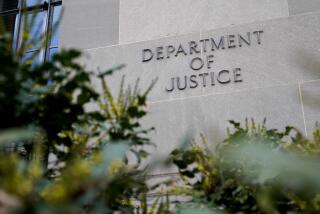Grand Jury Finds No Local Intent to Defraud U.S. on Medicare Billings
- Share via
Mental health administrators were sloppy in their oversight of Medicare billings but did not intentionally submit fraudulent claims to the federal agency, the grand jury concluded in a report released Thursday.
The 14-page report focused on billing irregularities that occurred over nearly a decade and resulted in $25 million in federal penalties in addition to accounting and legal costs.
Many of the grand jury’s findings mirror those found by federal and state auditors. Several of the panel’s recommendations, such as increasing supervision of billing operations, have already been put in place.
Although the citizens’ panel concluded there was no intent by officials in the Behavioral Health Department to defraud the federal government, the FBI is continuing its own criminal investigation.
David Nesbitt, supervisor of the Ventura FBI office, said the grand jury’s findings are interesting but “largely irrelevant” to his agency’s probe.
“We are working with the same set of facts and circumstances that they had but we have our own investigative effort,” said Nesbitt, who declined further comment.
As part of its settlement with the federal government, the county agreed to repay $15.3 million in Medicare reimbursement money after auditors found the county had systematically overbilled for mental health services during the 1990s. The county billed at higher physician rates in cases where patients were actually seen by social workers, nurses and psychologists.
The grand jury was investigating how the inappropriate billing practices came about. The panel issued several recommendations, including that oversight personnel in the Behavioral Health Department have more expertise of billing rules and regulations.
Mike Powers, deputy director of the Health Care Agency and a compliance officer, said he agreed with most of the grand jury’s recommendations, and said many of the problems already had been addressed.
“For the most part, the major problem with billing was lack of documentation and lack of treatment plans and those have been instituted,” Powers said.
The grand jury’s investigation failed to uncover why there had been no accountability in the billing process.
“When asked by the Grand Jury why billing personnel inserted the names of doctors who had not seen a patient for treatment,” the panel’s report stated, “those responsible for appropriate billing procedures tell us, ‘it was always done that way.’ ”
The grand jury reviews county government operations and issues reports, as well as handing down criminal indictments. Generally the reports serve as recommendations to supervisors, who seldom make policy changes based on the findings.
More to Read
Sign up for Essential California
The most important California stories and recommendations in your inbox every morning.
You may occasionally receive promotional content from the Los Angeles Times.












